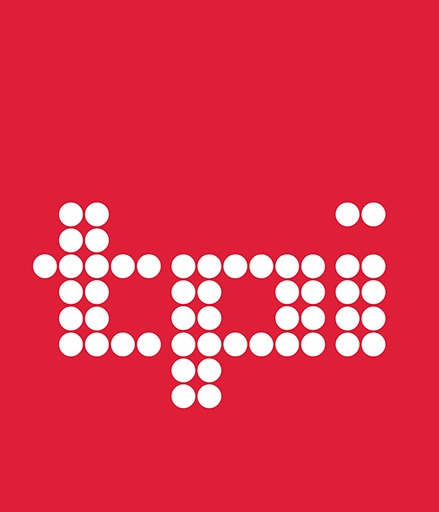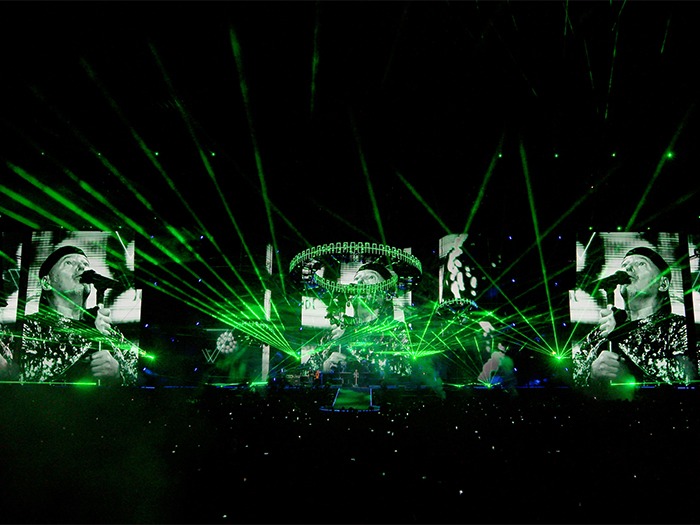Italian showman and megastar Vasco Rossi completed his Live 022 stadium tour this summer, comprising 11 spectacular, sold-out concert performances watched enthusiastically by three quarters of a million fans, with lighting designed by Vasco’s long-term LD, Giovanni Pinna.
Giovanni took the 71-metre-wide stage and over 1000 square meters of video surface in Gio Forma studio’s set concept as a starting point for lighting. He also seized the opportunity to incorporate some interesting technical innovations in the design including a zactrack SMART system to which he assigned multiple moving lights to follow the artist and band at strategic moments throughout this epic show.
Giovanni first saw zactrack in action at a demo in a theatre in Rimini earlier in the year. He was immediately impressed with its flexibility and envisioned how it could eliminate the need for over-stage follow spots on large shows. Having previously used other tracking systems, he realised the potential, and after a chat about programming and integrating cues via the lighting console, fully appreciated the user-friendliness, flexibility, and robustness of zactrack.
This was followed by a further and more in-depth walk-through of a zactrack set up at RM Multimedia, the brand’s Italian distributor, based in Cattolica, with a view to spec’ing it onto the forthcoming Vasco tour to replace five onstage follow spots with a range of tracking fixtures – which he then did.
The tour used a 2 server / 10 tracker (transmitter) zactrack SMART with 11 anchors (receivers) dotted around the stage, which was purchased by the tour’s lighting contractor BOTW and tech’d on the road by Marco Di Febo from RMM. This is a similar style to how audio departments have a radio mic tech.
zactrack uses an innovative (Ultra-Wide-Band) real-time radio tracking technology to make the challenging task of tracking performers smooth and adaptable. Advanced mathematics calculate and locate the correct position and orientation of the fixture in 3D space for the precise tracking of the target. A single zactrack server enables the simultaneous control of lighting fixtures, video effects and 3D sound.
“It is fantastic, there is no complicated wiring up or sensors involved, the artist just drops the tag into a pocket, and it is good to go,” he explained.
Two special pouches were sewn into Vasco’s belt, one at the front and one at the back, for concealing his trackers and he also absolutely loved the system! “It’s great having a system that is so comfortable for the artist,” noted Giovanni.
In addition to Vasco, the two guitarists and two bassists were all double tagged and followed as they enthusiastically sprinted around and utilised the massive stage and set area. “It was brilliant – simple, easy and dependable,” stated Giovanni, highlighting that he could have used much of his 500+ fixture lighting rig on the zactrack, but chose to hone it down to 49 luminaires for maximum effect.
These were mainly Robe MegaPointes and some Robe Spiider LED wash beams, all of which are light and very fast, making them ideal to pair with a zactrack system. The furthest fixture was around 21 metres from the stage.
The crew were also happy with this solution as it meant they did not have to rig and set up the five onstage spots for each show.
Marco co-ordinated and managed all the zactrack fixture assignment while Giovanni took care of programming the dimmer, zoom and iris on each of these lights, commenting it was a “very easy” process to assign and programme the zactrack movements into his grandMA2 console.
Different groups of fixtures were assigned to the musicians and integrated into the cue list and zactrack cues ran throughout the blockbusting two and a half hour set as Vasco thrilled the crowds with his charisma and stagecraft for which he constantly needed back light.
This alternated between, 4, 6 and 8 x MegaPointes depending on whereabouts he was on the stage. Giovanni had all these zactrack lights immediately to hand on a fader controlling just the dimmer to have an instantly accessible quick balance for the camera crew when needed.
He and Marco fine-tuned everything after the first couple of gigs, with Marco noting that he needed to calibrate the anchors just once over all 11 dates of the tour, while the fixtures were recalibrated for each show which was extremely quick.


